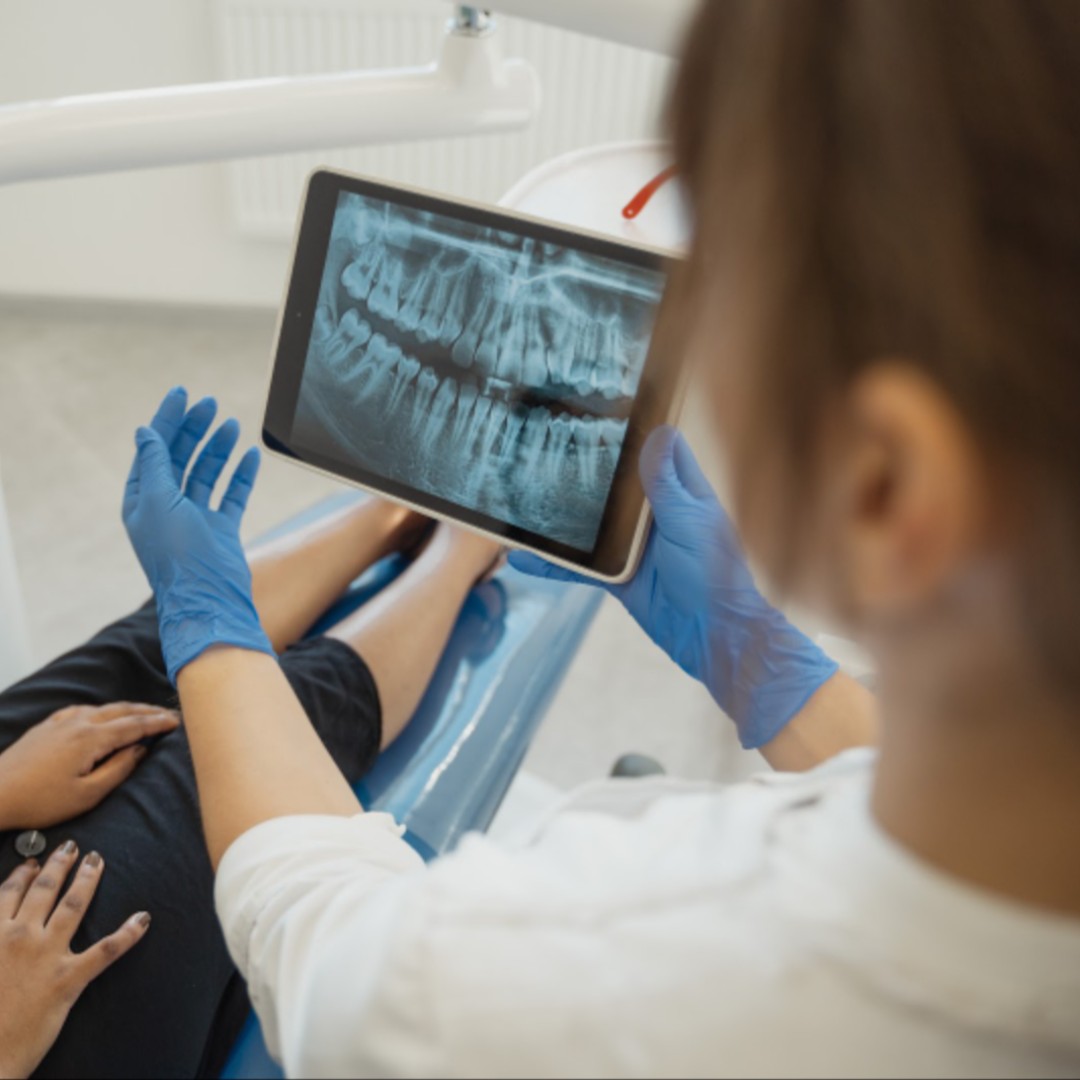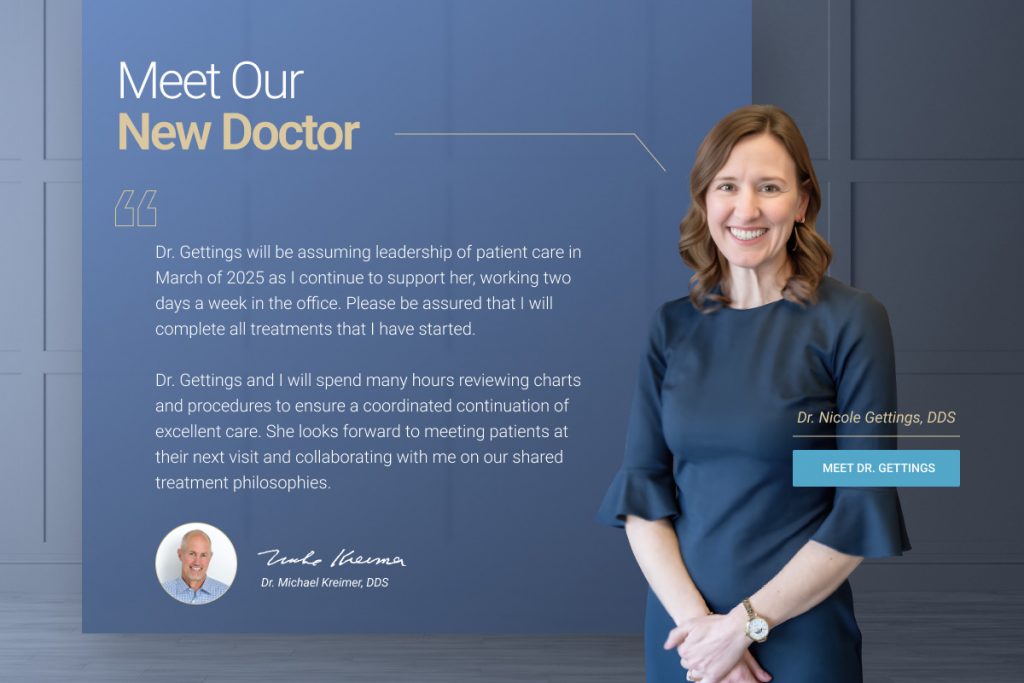Navigating the Path to Oral Wellness
Wisdom teeth, also known as third molars, are the last set of molars to emerge from the back of the mouth. While they once served an evolutionary purpose, nowadays, they often pose challenges to modern dental health. At our Loveland, OH, dental office, esteemed oral surgeon Dr. Michael Kreimer, provides wisdom tooth extraction, offering care to address these dental concerns.

What Is Wisdom Teeth?
Wisdom teeth, also known as third molars, typically appear in the late teens or early twenties, but not everyone develops them. Located in the far corners of the mouth, these molars can often become problematic for several reasons. In Loveland, Dr. Kreimer frequently encounters patients who are dealing with problems such as impaction, crowding, infection, and damage to adjacent teeth due to problematic wisdom teeth.
Signs Your Wisdom Tooth Needs Extraction
Recognizing the indications that your wisdom teeth may require extraction is essential for maintaining optimal oral health. Keep an eye out for the following signs:
- Persistent Pain or Discomfort: Continuous pain or discomfort in the back of your mouth, especially when chewing, may indicate issues with your wisdom teeth.
- Swelling and Redness: Swelling, tenderness, or redness around the back of your mouth and jaw may suggest inflammation or infection related to your wisdom teeth.
- Difficulty Opening Your Mouth: If you experience difficulty in fully opening your mouth or feel jaw stiffness, it could be a sign that your wisdom teeth are causing problems.
- Bad Breath or Unpleasant Taste: Persistent bad breath or a foul taste in your mouth, despite good oral hygiene, can be a sign of infection or decay around your wisdom teeth.
- Gum Tenderness or Bleeding: Tenderness or bleeding of the gums around your back molars may indicate impaction or other issues with your wisdom teeth.
- Jaw Pain or Headaches: Pain in the jaw joint or frequent headaches, especially in the back of the head, can be related to problematic wisdom teeth.
- Cysts or Tumors: In rare cases, cysts or tumors can form around impacted wisdom teeth, necessitating their removal.
- Pressure or Crowding: If your wisdom teeth are putting pressure on adjacent teeth or causing overcrowding, extraction may be recommended.
- Sinus Issues: Upper wisdom teeth roots may extend close to the sinus cavity, leading to sinus pain, pressure, or congestion.
- Recurrent Infections: Frequent infections around your back molars may indicate that your wisdom teeth are not erupting properly and may need removal.
Benefits of Wisdom Tooth Extraction
Wisdom tooth extraction offers a range of significant advantages for patients facing issues with their third molars. These benefits extend beyond immediate relief, contributing to long-term oral health and overall well-being.
- Alleviation of Pain and Discomfort: Removal of impacted or problematic wisdom teeth eliminates chronic pain and discomfort associated with issues like impaction, crowding, and inflammation.
- Prevention of Dental Complications: Extracting problematic wisdom teeth helps prevent potential complications, such as gum disease, tooth decay, and damage to adjacent teeth.
- Improved Oral Hygiene: With wisdom teeth removed, it becomes easier to maintain proper oral hygiene. Brushing and flossing are more effective, reducing the risk of plaque buildup and associated dental problems.
- Reduction of Oral Infections: Impacted wisdom teeth can create pockets where bacteria thrive, leading to infections. Extraction minimizes the risk of recurrent infections and related oral health issues.
- Prevention of Cyst and Tumor Formation: Left untreated, impacted wisdom teeth can lead to the development of cysts or tumors, which may require more extensive surgical procedures for removal.
- Prevention of Bite Irregularities: Wisdom teeth can exert pressure on neighboring teeth, causing shifting and misalignment. Extraction prevents potential bite irregularities and the need for orthodontic intervention.
- Enhanced Overall Oral Health: By removing problematic wisdom teeth, your overall oral health improves. This promotes a healthier mouth, reducing the likelihood of future dental complications.
- Reduction of Sinus Issues: Upper wisdom teeth roots can extend close to the sinus cavity. Extraction can alleviate potential sinus issues or discomfort caused by the proximity of these teeth.
- Elimination of Jaw Discomfort: Impacted wisdom teeth can exert pressure on the jawbone, leading to discomfort or pain. Extraction alleviates this strain on the jaw, promoting comfort and mobility.
- Lowered Risk of Systemic Health Issues: Researchsuggests that untreated oral infections, including those related to impacted wisdom teeth, may be associated with certain systemic health issues. Extracting problematic teeth helps lower this risk.
- Enhanced Quality of Life: A mouth free from the discomfort and complications of problematic wisdom teeth leads to an improved quality of life. Eating, speaking, and overall oral comfort are significantly enhanced.
- Peace of Mind and Confidence: Knowing that Dr. Kreimer treated the problematic wisdom teeth gives patients peace of mind and boosts their confidence in their oral health.

Wisdom Tooth Extraction Process
Initial Consultation
At Dr. Kreimer’s Loveland clinic, wisdom teeth extraction begins with a thorough initial consultation. During this crucial phase, patients can expect a comprehensive evaluation of their oral health. Dr. Kreimer carefully evaluates the condition and positioning of the wisdom teeth using state-of-the-art imaging techniques. This assessment allows for a personalized treatment plan tailored to each patient’s unique needs.
Dr. Kreimer’s commitment to patient comfort and informed care is central to the wisdom tooth extraction process. Before the procedure, patients engage in a detailed discussion of anesthesia options and pain management strategies. This collaborative approach ensures that patients feel empowered and confident in their treatment decisions.
Local Anesthesia
Before we begin your extraction procedure, he will provide local anesthesia and your choice of dental sedation to help you feel comfortable and relaxed. This approach not only minimizes discomfort but also promotes a smoother overall experience for patients.
Tooth Extraction
After ensuring the area is properly numbed, your Loveland dentist will make a small incision in the gum tissue over the wisdom tooth. This incision provides access to the tooth and its roots. Using precise instruments and a steady hand, he carefully removes the wisdom tooth from its position.
Depending on the position and condition of the tooth, it may need to be divided into smaller pieces for easier removal. Once he has successfully removed your wisdom tooth, he’ll close the incision with dissolvable stitches or sutures to help aid in the healing process and ensure the gums seal properly.
Post-Extraction Evaluation
Dr. Kreimer will evaluate the extraction site to ensure there are no remaining fragments, debris, or issues that require attention. This evaluation will help ensure you have a successful outcome.
After Your Procedure
Post-extraction, Dr. Kreimer’s care extends into the crucial recovery period. Patients will receive detailed and personalized instructions for immediate post-operative care, as well as long-term oral health maintenance.
By following these guidelines, discomfort is minimized, and the healing process is accelerated, allowing patients to return to their normal routines quickly. He will also schedule follow-up appointments to ensure that the area is healing properly and there are no complications.
Aftercare for Wisdom Tooth Removal
After undergoing a wisdom tooth extraction with Dr. Kreimer in Loveland, Ohio, it’s crucial to follow proper aftercare instructions to ensure a smooth and successful recovery. Here are the key steps to take post-procedure:
- Manage discomfort with prescribed pain relief.
- Apply a cold compress to reduce swelling.
- Control bleeding by gently biting on gauze.
- Practice gentle oral hygiene with warm saltwater rinses.
- Stick to soft, cool foods and avoid tobacco/alcohol.
- Rest and limit strenuous activities.
- Take prescribed medications as directed.
- Attend follow-up appointments for monitoring and guidance.
- Watch for signs of complications and seek prompt attention.
- Gradually resume normal activities as comfort allows.
Frequently Asked Questions
Are there any long-term effects of not removing wisdom teeth?
Yes, leaving impacted or problematic wisdom teeth untreated can lead to various complications, including infection, damage to neighboring teeth, and misalignment of the bite.
Will I need to have all four wisdom teeth extracted?
Not everyone develops all four wisdom teeth, and not all of them may require extraction. The necessity for extraction depends on factors such as their position, impaction, and impact on oral health.
What if my wisdom teeth have already caused damage to adjacent teeth?
In cases where wisdom teeth have caused damage to neighboring teeth, extraction is often recommended. Your dentist or oral surgeon will assess the extent of the damage and discuss the best course of action.
How long does the recovery period typically last after a wisdom tooth removal procedure?
The initial recovery period varies but generally lasts about a week. Full healing of the extraction site can take several weeks to a few months.
Ready to Take the First Step Towards a Healthier Smile?
If you’re experiencing discomfort or signs of trouble with your wisdom teeth, don’t wait. Call our Loveland office at (513) 677-3656 to schedule a consultationwith our Loveland dentist to determine if you’re a candidate for an extraction. We proudly provide services to new and returning patients in Cincinnati and surrounding areas like Murdock, Landen, Mason, and Reading, OH.



